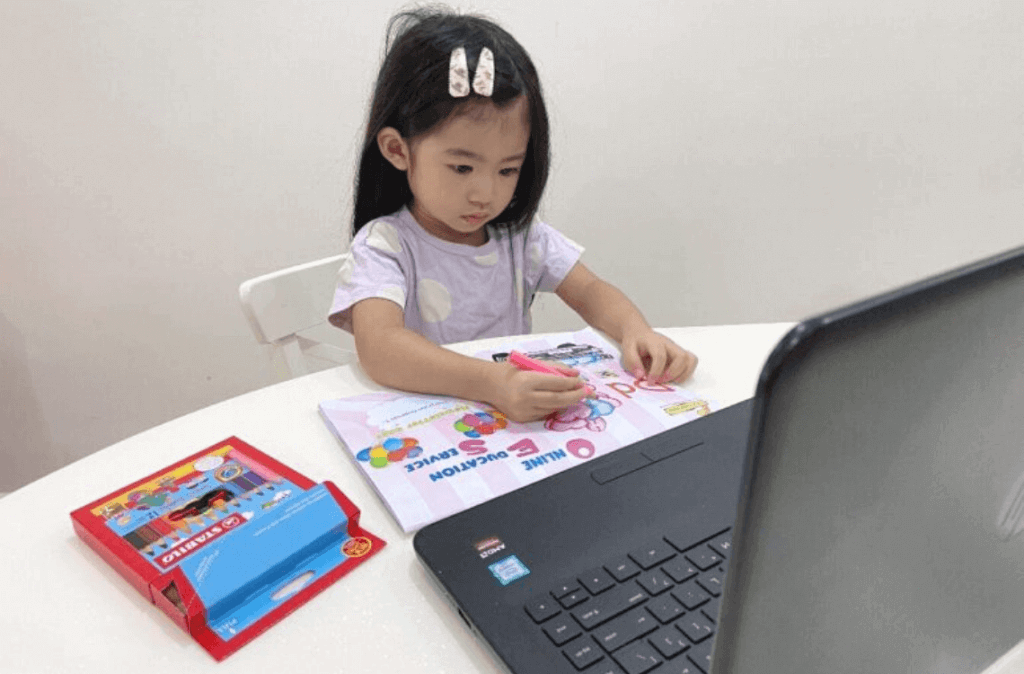If it is hard for 4-6 years old children to learn online, wouldn’t it be more challenging for 2-3 years old toddlers?
This was what troubled my cousin the most when she had to decide whether to enrol her 2-year-old toddler for online playschool learning.
My cousin, Michara, was interested to send her daughter, Bei En for play school learning sessions.
Unfortunately, due to the COVID-19 pandemic, playschool learning was only available through distant learning.
After some discussions with her husband and her friends, she decided to give online playschool a try.
Here’s her sharing on why your toddler should try online playschool and some factors that parents should look into before enrolling their toddlers.
Why Say Yes to Online Playschool?
#1: Your children get earlier exposure to learning
As parents, we always strive to provide our children with the best education.
With playschool learning available online, your toddlers can enjoy better options regardless of where you are.
Even if you live in a small town, your children can enjoy better education from kindergartens in big cities such as the ones in Penang Island and Kuala Lumpur, at the comfort of your home.
Instead of feeling confused and anxious about what and how to teach your toddlers, you can learn the right way to educate them too during the live classroom.
Similarly to face-to-face learning, online playschool learning also offers interesting and contextual learning content.
For instance, fun story-telling activities and animations can trigger our toddler’s curiosity to know more and therefore be willing to speak more with your guidance.
On top of this, cognitive development activities can stimulate your toddler’s brain to look at objects from different perspectives.
Our toddlers will also be able to develop fine motor skills through the physical training programme.
Emphasis is also put on the toddler’s social development through the introduction of simple good habit and character.
If you are concerned whether your toddler can learn effectively through online playschool, worry not. You will receive real parent’s tips on how to guide your toddler to reach the lesson objectives daily.
#2: More play time for you and your children
With online playschool learning, you can enjoy playing with your toddler at home.
A variety of exciting and meaningful activities are available with guidance through this e-learning.
You no longer need to waste your precious time scrolling through the internet to find freebies and printable activities for your toddler.
Instead, you can focus your attention playing with your toddler as pre-packed materials will be sent to your doorstep after your toddler’s enrolment.
For instance, both you and your children can enjoy messy play at home with the materials provided.
Weekly messy play activities have given Bei En the excitement to play and explore with raw materials and colours besides developing her sensory experiences of how things, taste, smell, and feel.
More importantly, these activities will strengthen her little fingers to control a pencil to start writing letters when she is 4 years old.
As playschool learning also involves arts and craft, you get the opportunity to bond with your children by completing the assignment together.
Having more time at home, Bei En’s father patiently made an aquarium diorama with his little toddler.
Starting from painting the underwater world until putting in the sea creatures and other sea elements for their diorama, Bei En’s father passionately guided her to complete her craft assignment.
Just as Bei En, your toddler will certainly be able to feel your love and care while playing and making crafts.
#3: You get to know more about your children’s learning
How do we improve ourselves in the best way?
You are right, it is when we know the areas that we are weak in. It is the same with our toddlers too.
The earlier you know about the areas your toddler needs to improve, the earlier you will be able to discuss with the professionals about the alternatives.
As for Bei En, her playschool teachers provided Michara and her husband feedback on Bei En’s learning too.
Her teachers mentioned the needs to improve Bei En’s English.
They had also provided Michara with some practical suggestions to help Bei En to learn English better.
So, instead of being clueless on what to focus on Bei En’s learning, Michara knows how to help her daughter in her learning.
She will read Bei En more English storybooks and interact with her in English every night before they sleep.
Parents’ Concern About Online Playschool
As parents, we share the same concern when it comes to the screen time of our children.
Do we really need to put our little toddler in front of the screen at such a young age for learning?
Before registering Bei En for the online playschool, Michara was quite concerned about whether online learning will affect Bei En’s eyesight.
Fortunately, each online learning session only lasts for 20 minutes and Bei En can retain her healthy screen time.
Another concern would be the need for parent’s accompaniment throughout the learning session.
As our toddlers are still in the initial stage of learning, they might not understand their teacher’s instructions.
They certainly need help from the adults in completing certain tasks.
Thus, online playschool learning might not be suitable for working parents who are unable to allocate their time during the learning session.
However, you can still get help from your parents or from your in-laws if you are certain that online playschool learning will benefit your toddler in the long run.
What’s Your Stand On Online Playschool Learning?
Putting aside the need for parent’s accompaniment, online playschool learning is worth trying and exploring with your toddler.
Why is it so? With online playschool, you will understand better about your toddler’s learning.
More importantly, you have the opportunity to be with your toddler during the learning and guide him/her through any problems and challenges.
With this. your toddler will truly feel loved, secured, as well as boosting their confidence during their learning.
